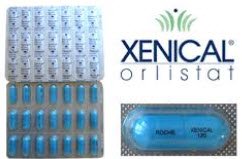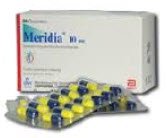PCOS and Weight Loss Prescription Medications
Weight loss alone can be effective for restoring a normal menstrual cycle and reducing your PCOS symptoms!
The healthiest way to lose weight is to eat a much healthier diet and to increase your exercise.
Free PCOS Newsletter
However, in some cases a physician may prescribe anti-obesity drugs such as orlistat (Xenical) or sibutramine (Meridia). It’s essential to understand that drugs alone are not effective unless other weight loss measures are employed.
Proper low calorie diets, smaller portions, and mindful eating habits – along with an adequate exercise routine – increase the ability for PCOS patients to lose weight. As a result of sufficient weight loss, you may see endocrine abnormalities improve and thus improve other symptoms of this very distressing condition.
Orlistat (Xenical)

Orlistat is sometimes used in PCOS (polycystic ovary syndrome) as a weight loss agent. Orlistat acts as a lipase inhibitor to prevent the absorption of dietary fat. Lipase is an enzyme made in our body that helps break down fat molecules into smaller, more easily absorbed particles. Orlistat stops this process from happening, thereby inhibiting the absorption of fat.
Instead, the fat is passed through the body and eliminated in the stool. Patients using Orlistat have seen other benefits from its use other than weight loss. It appears to help lower cholesterol and triglycerides as well as insulin levels, which helps to prevent insulin resistance.
Orlistat is typically prescribed to be taken with fatty meals up to 3 times per day. If the patient misses a meal or the meal does not contain fat, the dose can be skipped for that mealtime.
However, as effective and safe as this drug may be, the adverse gastrointestinal (digestive) side effects may be intolerable for some patients. These include diarrhea, malodorous (smelly) stool, urgency with bowel movement, fecal incontinence (inability to hold stool) and staining of undergarments. It is thought that the risk of these side effects is upwards of 30% and most severe after a fatty meal.
Orlistat also blocks the absorption of the fat soluble vitamins A, D, E, and K. The interference with vitamin D absorption is especially worrisome because the majority of women with PCOS already have a vitamin D insufficiency. Therefore, a multi-vitamin/mineral containing these nutrients must be taken at least once per day but 2 hours away from the Orlistat dose.
Special precautions need to be taken if the patient has a history of anorexia nervosa, bulimia, gallstones, thyroid disease, diabetes, kidney problems or malabsorption syndrome. Possible drug interactions include using blood thinners such as Coumadin, diabetes medications including insulin, pravastatin, cyclosporine and other weight loss medications.
Sibutramine (Meridia)

Sibutramine (Meridia) is classified as an anti-obesity drug for PCOS patients due to its effect on appetite. By increasing the neurotransmitters norepinephrine, serotonin and dopamine in the brain, sibutramine creates a full feeling and thereby decreases appetite. Ultimately, it is an appetite suppressant and is used to help PCOS patient lose weight.
However, the disadvantages of Meridia may outweigh the advantages. It may increase blood pressure and pulse. Due to its effect on the brain and central nervous system, it has many potential interactions with central nervous system stimulants and depressants which could potentially include caffeine, nicotine and alcohol.
The typical dose is 10 mg daily to start. Blood pressure needs to be monitored throughout treatment with this medication. Precautions need to taken due to possible drug interactions with anti-depressants, St. John’s wort, tryptophan, migraine medications such as Imitrex, and narcotics. Sibutramine should NOT be taken if you have a history of seizures or epilepsy, heart attack, cardiac arrhythmias or irregular beats and glaucoma. It should NOT be taken during pregnancy.
If you're taking Meridia, you may also want to take supplemental l-carnitine.
A study from the University of Pavia in Italy studied 254 patients with
uncontrolled diabetes. One group took sibutramine while another group
took sibutramine plus l-carnitine.
The people taking the
l-carnitine supplement got better results in terms of controlling blood
sugar, reducing body weight, and all other health measures. The study's
authors conclude: "Sibutramine plus l-carnitine gave a better and faster
improvement of all the analyzed parameters compared with sibutramine
alone without giving any severe adverse effect."
Related Articles
- Why You're Overweight
- Weight Loss Diet
- Hormones and Your Weight
- 10 Ways to Lose Belly Fat
- Liposuction, Ovulation, Vitamins Can Help
Source: Derosa G et al. Effects of combination of sibutramine and L-carnitine compared with sibutramine monotherapy on inflammatory parameters in diabetic patients. Metabolism. 2011 Mar;60(3):421-9.
Get Answers to your Questions about
- Fertility
- Weight Control
- Hair Loss
- Stress
- Unwanted Hair
- Acne...and more!
FREE PCOS Report
and Newsletter

Your email is safe with us. We respect your privacy, and you may unsubscribe at any time.
Recent Articles
-
PCOS Long Journey to The Happy End
Apr 30, 18 07:24 PM
Hi Girls, Maybe my story will have one day a good end but I am not there yet. Until I was 31 years old I lived my dream, having lovely husband, good -
PCOS and Miscarriage
Apr 17, 18 04:03 PM
Proper diet and natural supplements can help the body maintain a pregnancy through successful delivery.
-
How to Deal with PCOS and Stress
Apr 04, 18 04:19 PM
Your body has a natural capacity to heal itself if you provide it with the necessary tools.






